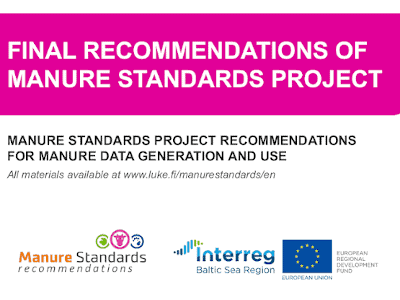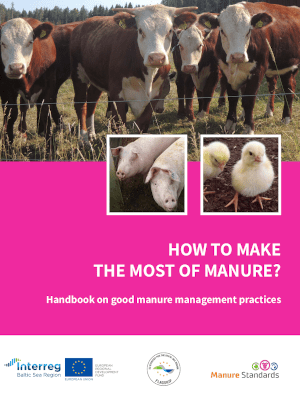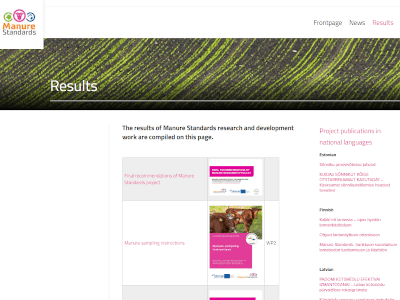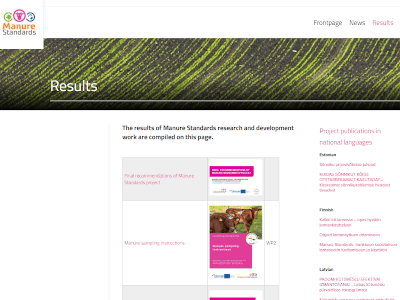MANURE STANDARDS
Animal manure as a source of nutrients
Agriculture releases large quantities of nutrients into the Baltic Sea, with a significant amount of emissions from animal manure. This contributes to increasing of the euthrophication processes in the sea waters. The actual figures, however, are difficult to assess due to incomparable measuring methods and different ways of collecting data across the Baltic Sea region countries.
Lack of standards
Smart nutrient management in agriculture is one of the most efficient agri-environmental measures to reduce input of nutrients into the Baltic Sea. Currently, most manure is spread on fields as fertiliser without processing. If the manure is used in precision, the nutrient inflow from manure into the Baltic Sea could instantly be reduced. In order to achieve that, farmers and advisers need tools for proper nutrient bookkeeping, along with efficient fertilisation plans and nutrient balances. Equally important is to develop measuring methods that are transparent and harmonised, and applied at all levels: from farms up to the regional and national level across the Baltic Sea region.
Budgets
in numbers
-
2.87MillionTotal
-
1.91MillionErdf
-
0.37MillionEni + Russia
-
0.00MillionNorway
Achievements
Tools for better handling manure
The partners helped farmers and their advisors use manure as a resource more wisely and efficiently on almost 100 farms in Denmark, Estonia, Finland, Germany, Latvia, Lithuania, Poland, Russia and Sweden. Thanks to research, comparing samples and calculating manure content across the farms, the partners developed tools that can universally be applied in the region. Now, farmers and their advisors have the means to collect more precise manure data. Based on the data, they can better plan the fertilisation processes with manure on their farms, use the correct amount of the manure as a fertiliser and – in this way – cut costs on buying mineral fertilisers and reduce emissions into the environment. For example, thanks to a manure properties calculation tool, farmers in Estonia can now implement efficient fertilisation with manure and ensure adequate capacity for manure storage.
Harmonanisation on the national level
The partners also helped agricultural and environmental authorities keep national and regional manure data updated. The data help shape manure-related policies and authoritative measures developed by the authorities in their daily work.
Thanks to the project, in Sweden, it was agreed to use the new calculation tool developed by the project partners. In Latvia, national authorities decided to update sampling and analysis methodology to get more precise data on manure composition, including nutrient content. In Finland, the Finnish Food Authority and the authorities responsible for environmental permitting of animal farms started using the project tools as guidelines to improve the permitting and surveillance processes. The authorities in Estonia plan to change the regulation on manure data generation and turn the farm-level calculation tool into an official tool for measuring manure nutrients and emissions on farms.
From local to pan-Baltic results
In the pan-Baltic context, based on the project results, the Baltic Marine Environment Protection Commission (HELCOM) developed and adopted the recommendations on the use of national manure standards. These recommendations guide the Baltic Sea region countries to improve manure data by establishing as well as reviewing and updating the national standard values for manure. HELCOM also uses the project results in preparing a Baltic Sea Regional Nutrient Recycling Strategy.
Thanks to the EUR 1.91 million support from the EU, the Interreg project Manure Standards delivered practical tools for effective manure management on a farm, regional, national and pan-Baltic levels. Researchers together with farmers and agricultural advisors from nine countries proved that manure management should be based on up-to-date data on manure quantity and composition. This is the way to maximise benefits manure brings as a valuable fertiliser and to minimise losses to the environment.
Outputs
Recommendations for manure data generation and use

Handbook "How to make the most of manure?"

Guidelines for manure sampling and analysis

Calculation tools for the quantity and composition of livestock manure

Project Stories
-
18.05.2021
SuMaNu featured on interreg.eu portal
From Adriatic to Baltic Sea: read how to achieve clear waters through cooperation and use #MadeWithInterreg smart ideas to save the seas from pollution.Read full story -
09.09.2020
Interview: “Interreg projects can push into the right direction”
To improve the water quality of the sea has been a continuous objective of Interreg Baltic Sea Region and its predecessor programmes. Many projects have received funding to reduce negative impacts of agriculture on the sea. The platform SuMaNu gathers and synthesises best practices and recommendations on nutrient management. We interviewed Henning Lyngsoe Foged from Aarhus, Denmark, who has been one of the driving forces to spread agri-environmental innovations across countries around the Baltic Sea.Read full story
Partners
Natural Resources Institute Finland Luke
- TownHelsinki
- RegionHelsinki-Uusimaa
- CountryFinland
- RepresentativeSari Luostarinen
- Phone
- E-Mail
- Web
Institute of Soil Science and Plant Cultivation
- TownPuławy
- RegionPuławski
- CountryPoland
- RepresentativeBeata Jurga
- Phone
- E-Mail
- Web
RISE Research Institutes of Sweden
- TownUppsala
- RegionUppsala län
- CountrySweden
- RepresentativeLena Rodhe
- Phone
- E-Mail
- Web
HELCOM
- TownHelsinki
- RegionHelsinki-Uusimaa
- CountryFinland
- RepresentativeSusanna Kaasinen
- Phone
- E-Mail
- Web
Lithuanian University of Health Sciences
- TownKaunas
- RegionKauno apskritis
- CountryLithuania
- RepresentativeVytautas Ribikauskas
- Phone
- E-Mail
- Web
Estonian University of Life Sciences
- TownTartu
- RegionLõuna-Eesti
- CountryEstonia
- RepresentativeAllan Kaasik
- Phone
- E-Mail
- Web
Julius-Kühn-Institute (JKI), Federal Research Centre for Cultivated Plants
- TownBraunschweig
- RegionBraunschweig, Kreisfreie Stadt
- CountryGermany
- RepresentativeKatrin Kuka
- Phone
- E-Mail
- Web
Finnish Environment Institute SYKE
- TownHelsinki
- RegionHelsinki-Uusimaa
- CountryFinland
- RepresentativeJuha Grönroos
- Phone
- E-Mail
- Web
Aarhus University
- TownTjele
- RegionVestjylland
- CountryDenmark
- RepresentativePeter Lund
- Phone
- E-Mail
- Web
Danish Agriculture & Food Council, SEGES
- TownAarhus N
- RegionVestjylland
- CountryDenmark
- RepresentativeTorkild Birkmose
- Phone
- E-Mail
- Web
Swedish Board of Agriculture
- TownJönköping
- RegionJönköpings län
- CountrySweden
- RepresentativeUlrika Listh
- Phone
- E-Mail
- Web
State Plant Protection Service
- TownRiga
- RegionRīga
- CountryLatvia
- RepresentativeLinda Būcēna
- Phone
- E-Mail
- Web
Estonian Crop Research Institute
- TownJõgeva
- RegionLõuna-Eesti
- CountryEstonia
- RepresentativeKalvi Tamm
- Phone
- E-Mail
- Web
The Central Union of Agricultural Producers and Forest Owners (MTK)
- TownHelsinki
- RegionHelsinki-Uusimaa
- CountryFinland
- RepresentativeAiri Kulmala
- Phone
- E-Mail
- Web
Agricultural Advisory Center in Brwinów
- TownBrwinow
- RegionWarszawski wschodni
- CountryPoland
- RepresentativeMateusz Sekowski
- Phone
- E-Mail
- Web
Union Farmers' Parliament
- TownRiga
- RegionRīga
- CountryLatvia
- RepresentativeInga Berzina
- Phone
- E-Mail
- Web
"SUCCEEDED by PP20 (25.05.2018)" Federal State Budget Scientific Institution “Institute for Engineering and Environmental Problems in Agricultural Production – IEEP
- TownSaint Petersburg
- RegionCity of St. Petersburg
- Country
- RepresentativeNatalia Oblomkova
- Phone
- E-Mail
- Web
State budgetary vocational educational institution of the Pskov region "Pskov agrotechnical college"
- TownPskov
- RegionPskov Oblast
- Country
- RepresentativeIuliia Tikhanova
- Phone
- E-Mail
- Web
Interregional Public Organization "Society for Assistance of Sustainable Rural Development"
- TownSt.-Petersburg
- RegionCity of St. Petersburg
- Country
- RepresentativeVladislav Minin
- Phone
- E-Mail
- Web
Federal State Budgetary Scientic Instition , Federal Scientific Agroengineering Center VIM IEEP-branch of FSBSI FSAC VIM
- TownSt. Petersburg
- RegionCity of St. Petersburg
- Country
- RepresentativeNatalia Oblomkova
- Phone
- E-Mail
- Web
-
Project managerSari LuostarinenNatural Resources Institute Finland Luke
-
Legal representativeJohanna BuchertNatural Resources Institute Finland Luke
-
Financial managerRaili KeronenNatural Resources Institute Finland Luke
-
Communication managerMiitta EronenNatural Resources Institute Finland Luke



